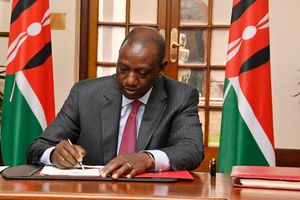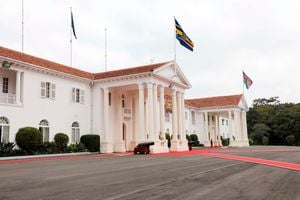
Times Tower, the Kenya Revenue Authority's head office in Nairobi.
Politics is often a game of smoke and mirrors. Both are used to deflect attention from the real issue, and while the body politic is distracted, the politician strikes. Citizen, beware of smokescreens.
The natural human reaction on seeing billows of smoke is alarm. If the smoke seems to be coming from their house, well, outright panic.
To save the house, they will rush toward it, a pail of water in hand, as they scream for help. But suppose the citizen is actually observing a reflection on a giant mirror? They will be erroneously rushing towards the mirror, not realizing that in reality, the danger is in the opposite direction.
In regular usage, a smokescreen is a ruse, intended to conceal one’s true actions or intentions. It is common practice in military operations. And it is the daily conduct of politics. So, when the regime ignited a war of words with the Judiciary a few weeks ago, a friend of mine and I mused at the perfect smokescreen.
Over tea, we wondered what the regime was up to. They were trying too hard to convince the republic that the Judiciary had stopped them from their noble and urgent tasks of building affordable housing and providing universal health care. Yet it is clear they were misleading the people.
The courts did not stop them from building houses. Rather, the court rightfully found that the housing tax was structured in a discriminatory way, which is unconstitutional. The court was actually rather sympathetic to the regime, allowing tax collection to continue until an intended government appeal was lodged and determined. This caused murmurs among employers and employees alike. If the tax is discriminatory, why allow it for even one more day?
But a fight between the Judiciary and the Executive was perhaps inevitable. This outcome was created, in part, by the Judiciary’s own missteps. At the beginning of this administration, the Judiciary failed to make the distinction between the president’s role as head of state, and his role as head of government.
They fell into the mental trap created by the idea of three arms of government. In our presidential system, it is better to think of them as three arms of state. The first phraseology attacks the principles of separation of powers. If the Judiciary is an arm of government, does it not answer, then, to the head of government?
The president presides over the swearing-in of judges not as head of government, but as head of state. The judges are not pledging allegiance to the government of the day. Rather, to the Republic and the constitution. Part of Judiciary’s role is to check and balance executive power. As a citizen, when you are aggrieved by executive power, say discriminatory taxes, you seek protection of the court!
That failure to appreciate the separate roles of head of state and head of government led to situations where the Chief Justice would be standing in line with the political class as they waited to greet the president in some function. This should never, ever happen. Reflect on the choreography of state functions. They are formal. The president or visiting head of state will proceed to inspect a guard of honour on arrival. The heads of the other arms of state are already in their designated spots.
In ordinary presidential functions, there is no guard of honour. What to do then to announce the arrival of the president? Line up senior officials to greet him.
If the war of words is a smokescreen, what is it concealing? More taxes!
When the national assembly resumes this February, they will be expected to approve the Budget Policy Statement (BPS) 2024. That approval will mean a new round of tax increases. And by the time the finance bill 2024 is introduced in June, it will be a fait accompli. This year, the regime is seeking 2.58 trillion shillings in taxes from you. The BPS proposes that starting this June, you pay an additional Sh382 billion.
And if you found the 2023 finance act harsh, this year’s version will be brutal. Some of the proposals include VAT on education services, taxing farm produce delivered to cooperatives and other organized groups, and re-introduction of minimum income tax. Other proposals include withholding tax on payments for goods supplied to government, VAT on insurance services, and eliminating the intermediate goods category in the common external tariff. Other proposals are taxation of informal sector and introduction of a motor vehicle circulation tax payable annually by motor vehicle owners.
The BPS was made public on December 18. A month later, there is hardly any debate. Instead, national attention is focused on the shadow boxing between Executive and Judiciary. Why did the regime announce that they intend to ignore court orders? They could have just proceeded. After all, a tiger needs not announce its tigeritude.
But they needed controversy to hold the nation’s attention. And if they could spin a tale that their work was being impeded, all the better, because it could mask their year and half of economic mismanagement. The real intention is the passage of the BPS, and with it, 382 billion shillings in new taxes. A “fight” with the Judiciary was a perfect cover.
And the latter are willing participants. The legal fraternity was up in arms. The CJ called for a truce, offering negotiations with the Executive, generating the obvious question. Can justice be negotiated? The Supreme Court, wanting some of the action, stepped into the fray. By banning a lawyer and his firm from ever appearing before it, they have now created a real controversy to replace the contrived one!
@NdirituMuriithi is an economist







